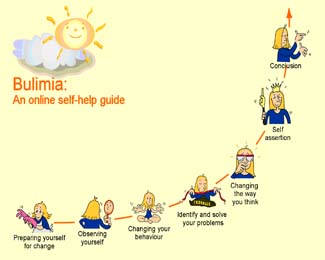On-line control of bulimia

Medical professionals also use Internet as a new therapeutic treatment method. It is considered to be a valid alternative follow-up resource which can complement current face to face doctor visits. This “science at a distance” is already being used in cases of psychological disorders such as purging bulimia nervosa. For this reason the Department of Psychobiology and Methodology at Universitat Autònoma de Barcelona (UAB) carried out an evaluation research on the Internet Based Therapy (IBT), a therapeutic programme where adult women diagnosed with bulimic symptoms can complement their therapy when and where they please. To do so, IBT reinforces psychoeducational and behavioural aspects together with the work of a trainer-therapist and face to face assessment sessions. The results of the research couldn't be better: patients gain more self-control and there is a decrease in the negative conducts associated with the disorder, such as anxiety.
Given the interest of many national health care systems in extending the accessibility of services and treatment programs, especially in rural areas far away from urban centers, telemedicine has started to be applied in many illnesses. Internet therapy programs have recently been applied with success in diverse psychological disorders and they have significantly decreased patients’ dysfunctional impairment. A variety of new technologies have been developed and employed to restrain some frequent problems related to eating, but specific internet based programs for bulimia nervosa are scarce.
Purging bulimia nervosa is an eating disorder characterized by recurrent binge eating followed by inadequate compensatory behaviors, such as over-exercising, self-induced vomiting and other purging episodes (uses of laxatives, enemas or diuretics) to avoid weight increase. Although the causes of bulimia are not totally described and approved by consensus in the scientific area, there is evidence about relevant psychosocial risks factors that may contribute to its onset and development: maladaptive learned behaviors towards food, irrational emphasis on physical appearance, some family disturbances, great attempts for self-control and parental obesity. The clinical profile is characterized by a special concern about body image and weigh, and it is usually associated with other mood disorders and anxiety (phobias and obsessive-compulsive symptoms are frequent comorbities). This impairing disorder typically begins in the adolescence or early adulthood and it is more prevalent among females (the ratio women-men is around 9-1 in developed countries).
The aim of our study was to value the short-term effectiveness of an Internet Based Therapy (IBT) in a sample of adult female patients diagnosed of purging bulimia nervosa, with a mean age of 24 years-old and a mean duration of the illness equal to 6 years. This program included psycho-educational and cognitive behavioral therapy concepts. It was structured in seven sequential steps and required that participants worked by themselves for 4 consecutive months. During this time, they were requested to maintain a weekly contact with their coach (using a secured messaging module) and they were assessed through two face-to-face evaluations with coaches.
Our study provides evidence of a significant decrease in psychopathological levels and severity of bulimic behavior of patients who used the IBT. Furthermore, the program helps bulimic patients to re-establish self-control over eating behavior and to reduce the emotional component associated with this disorder, such as anxiety. The first eight weeks of treatment demonstrated to be a crucial period in order to achieve a correct therapeutic adherence. We also proved that the success rates for this therapy were significantly higher (in statistical and clinical terms) than for control groups which did not received any intervention. Therefore, this online self-help approach appears to be a valid treatment option for controlling bulimic symptoms in adult women.
References
Fernández-Aranda F, Núñez A, Martínez C, Krug I, Cappozzo M, Carrard I, Rouget P, Jiménez-Murcia S, Granero R, Penelo E, Santamaría J, & Lam T. (2009). Internet-based cognitive-behavioral therapy for bulimia nervosa: A controlled study. CyberPsychology and Behavior, 12(1), 37-41.


